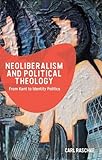Neoliberalism and Political Theology : From Kant to Identity Politics / Carl Raschke.
Material type: TextPublisher: Edinburgh : Edinburgh University Press, [2022]Copyright date: ©2019Description: 1 online resource (208 p.)Content type:
TextPublisher: Edinburgh : Edinburgh University Press, [2022]Copyright date: ©2019Description: 1 online resource (208 p.)Content type: - 9781474454551
- 9781474454575
- 320.513 23
- HB95 .R37 2019eb
- online - DeGruyter
| Item type | Current library | Call number | URL | Status | Notes | Barcode | |
|---|---|---|---|---|---|---|---|
 eBook
eBook
|
Biblioteca "Angelicum" Pont. Univ. S.Tommaso d'Aquino Nuvola online | online - DeGruyter (Browse shelf(Opens below)) | Online access | Not for loan (Accesso limitato) | Accesso per gli utenti autorizzati / Access for authorized users | (dgr)9781474454575 |
Frontmatter -- Contents -- Acknowledgements -- Introduction -- 1 Towards a Genealogy of Neoliberalism -- 2 Progressive Neoliberalism and its Discontents -- 3 Mediatic Hegemony: The Kingdom, the Power, the Glory and the Tawdry -- 4 Killing Us Softly: On Neoliberal ‘Truth’ Protocols -- 5 The Epistemic Crisis -- 6 Globalism, Multiculturalism and the ‘Politics of Recognition’ -- 7 The Deep Political Theology of Neoliberalism -- 8 Endings -- Notes -- Index
restricted access online access with authorization star
http://purl.org/coar/access_right/c_16ec
Shatters the common academic myth that neoliberalism is simply free market fundamentalism plus political conservatism Explains how neoliberalism is a regime of culture and values – far more than political economy Turns much of today’s progressive politics upside down by showing that many of the would-be liberators are really the exploiters: as Marx and Engels declared, the ‘ruling ideas’ of our era must be unmasked as ‘the ideas of the ruling class’ Offers a vision of what might lie beyond neoliberalism Connects the analysis of neoliberalism to the cultural diagnosis of Friedrich Nietzsche, who declared ‘God is dead’Neoliberalism in recent years has become the operative buzzword among pundits and academics to characterise an increasingly dysfunctional global political economy. It is often – wrongly – identified exclusively with free market fundamentalism and illiberal types of cultural conservatism. Combining penetrating argument and broad-ranging scholarship, Carl Raschke shows what the term really means, how it evolved and why it has been so misunderstood. Raschke lays out how the present new world disorder, signalled by the election of Trump and Brexit, derives less from the ascendancy of reactionary forces and more from the implosion of the post-Cold War effort to establish a progressive international moral and political order for the cynical benefit of a new cosmopolitan knowledge class, mimicking the so-called civilising mission of 19th-century European colonialists.
Mode of access: Internet via World Wide Web.
In English.
Description based on online resource; title from PDF title page (publisher's Web site, viewed 29. Jun 2022)


